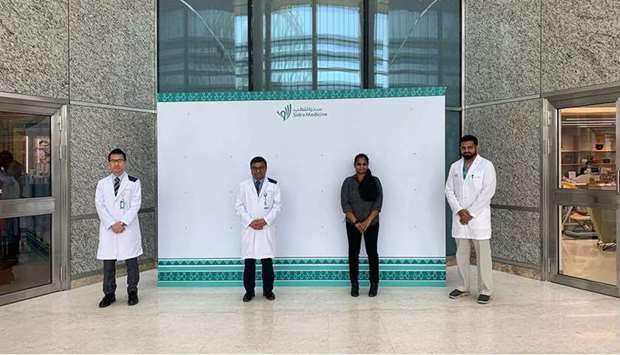In a collaboration led by teams from Pathology and the Genomics Core at Sidra Medicine, a study has been published about a novel point mutation in the Sars-CoV-2 genome that may affect Covid-19 testing by an FDA-approved test.
The study calls to action for testing centres worldwide to monitor mutations in the virus and ensure that testing methods are up to date, and based on multiple gene targets to avoid possible false-negative results.
The findings, which have been published in the 'Journal of Clinical Microbiology', highlight Sidra Medicine’s continuing role in supporting global efforts to tackle the pandemic.
Dr Mohamed Rubayet Hasan, clinical molecular microbiologist from the Pathology Department at Sidra Medicine, who led the study, said, “Since the beginning of the pandemic, worldwide laboratory testing to detect Covid-19 by real-time reverse transcription PCR (RT-qPCR) has played a central role in mitigating the spread of the virus. Soon after the viral genome sequences were available, several RT-qPCR assays were developed and made available by the World Health Organisation for public use. However, the large-scale sustained person-to-person transmission of Covid-19 has led to many mutational events, some of which may affect the sensitivity and specificity of available PCR assays (tests).”
The Sidra Medicine team noticed samples from several unrelated patients were positive for only one viral gene target, which led them to suspect that some of the viruses circulating in Qatar may have this common mutation. By examining the genetic sequence of these viruses, they identified a new mutation in a commonly used gene target for Covid-19 detection and found that the same mutation was present in viruses recovered from epidemiologically unrelated individuals. They also noted that this particular mutation had not been reported by any other country.
“Current testing methods have played a central role in mitigating the virus' spread through early detection, tracing suspected cases, and screening at-risk populations. Therefore the implications of inaccurate test results could cause health authorities to lose track of Covid-19 positive individuals. Infected patients may unknowingly spread the virus, and the erroneous test results could affect infected individuals' medical care. Our study concludes that it is essential to ensure RT-qPCR methods used for Covid-19 testing are up to date and inclusive of such variants in case further mutations make the virus undetectable by existing molecular tests,” said Dr Hasan.
Dr Patrick Tang, division chief of microbiology, Sidra Medicine said, “Our findings also highlighted the importance of testing for multiple Sars-CoV-2 gene targets and quickly investigating any unusual results with genetic sequencing. This is particularly in other countries where there is rampant spread of Covid-19. The prevalence of this novel Sars-CoV-2 mutation in Qatar is low, and it is unlikely that such viruses will escape detection locally because Covid-19 testing in Qatar is almost all based on detecting multiple viral targets.”
The Sidra Medicine team comprised Dr Mohamed Rubayet Hasan, Dr Sathyavathi Sundararaju, research specialist; Dr Chidambaram Manickam, staff scientist associate; Faheem Mirza, senior technologist; Hamad al-Hail, technologist; Dr Stephan Lorenz, director, Genomics Core; and Dr Patrick Tang.

Dr Mohamed Rubayet Hasan
|
Dr Mohamed Rubayet Hasan, clinical molecular microbiologist from the Pathology Department at Sidra Medicine, who led the study, said, “Since the beginning of the pandemic, worldwide laboratory testing to detect Covid-19 by real-time reverse transcription PCR (RT-qPCR) has played a central role in mitigating the spread of the virus. Soon after the viral genome sequences were available, several RT-qPCR assays were developed and made available by the World Health Organisation for public use. However, the large-scale sustained person-to-person transmission of Covid-19 has led to many mutational events, some of which may affect the sensitivity and specificity of available PCR assays (tests).”
The Sidra Medicine team noticed samples from several unrelated patients were positive for only one viral gene target, which led them to suspect that some of the viruses circulating in Qatar may have this common mutation. By examining the genetic sequence of these viruses, they identified a new mutation in a commonly used gene target for Covid-19 detection and found that the same mutation was present in viruses recovered from epidemiologically unrelated individuals. They also noted that this particular mutation had not been reported by any other country.
“Current testing methods have played a central role in mitigating the virus' spread through early detection, tracing suspected cases, and screening at-risk populations. Therefore the implications of inaccurate test results could cause health authorities to lose track of Covid-19 positive individuals. Infected patients may unknowingly spread the virus, and the erroneous test results could affect infected individuals' medical care. Our study concludes that it is essential to ensure RT-qPCR methods used for Covid-19 testing are up to date and inclusive of such variants in case further mutations make the virus undetectable by existing molecular tests,” said Dr Hasan.
Dr Patrick Tang, division chief of microbiology, Sidra Medicine said, “Our findings also highlighted the importance of testing for multiple Sars-CoV-2 gene targets and quickly investigating any unusual results with genetic sequencing. This is particularly in other countries where there is rampant spread of Covid-19. The prevalence of this novel Sars-CoV-2 mutation in Qatar is low, and it is unlikely that such viruses will escape detection locally because Covid-19 testing in Qatar is almost all based on detecting multiple viral targets.”
The Sidra Medicine team comprised Dr Mohamed Rubayet Hasan, Dr Sathyavathi Sundararaju, research specialist; Dr Chidambaram Manickam, staff scientist associate; Faheem Mirza, senior technologist; Hamad al-Hail, technologist; Dr Stephan Lorenz, director, Genomics Core; and Dr Patrick Tang.

